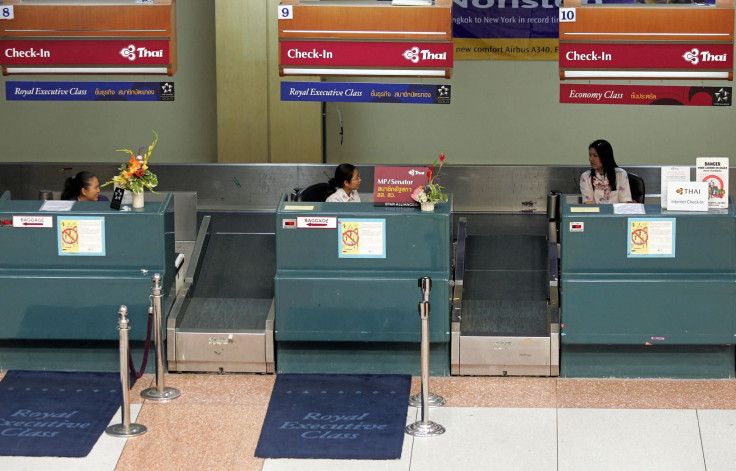Coronavirus Update: Lack Of Chinese Travelers Could Badly Hurt Thailand’s Tourist Economy

KEY POINTS
- Thailand now has 25 confirmed cases of coronavirus
- Bangkok is at the very highest risk among foreign cities from the spread of China’s coronavirus
- Chinese tourist arrivals in Thailand may plunge by 80% in the first four months of the year
On Monday evening, Thailand’s health ministry confirmed six new cases of the coronavirus, raising the country’s total number of infections to 25.
Bangkok, Thailand is at the very highest risk among foreign cities from the spread of China’s coronavirus according to a study by population mapping experts at the University of Southampton in England.
The report was based on an analysis of air travelers expected to fly from virus-stricken Chinese cities to foreign destinations.
Andrew Tatem, professor of geography and environmental science at the University of Southampton, said: "It's vital that we understand patterns of population movement, both within China and globally, in order to assess how this new virus might spread -- domestically and internationally. By mapping these trends and identifying high-risk areas, we can help inform public health interventions, such as screenings and health care preparedness."
The study noted that authorities in Wuhan, China – the epicenter of the virus – estimated that more than 5 million people (out of a total population of some 11 million) had already left the city during the early stages of the recent lunar year holiday. The city is now under a heavy lockdown.
"The spread of the new coronavirus is a fast moving situation and we are closely monitoring the epidemic in order to provide further up-to-date analysis on the likely spread, including the effectiveness of the transport lockdown in Chinese cities and transmission by people returning from the lunar new year holiday, which has been extended to [Feb. 2]," said lead report author Dr. Shengjie Lai of the University of Southampton.
In addition, more than 180,000 Chinese tourists who entered Thailand over the past two months still remained in the country.
As of Monday evening, Thai Airways International reduced flights to major cities in China but had not halted services entirely.
Still, Chinese travelers have not been journeying to Thailand in large numbers in recent days, partly due to travel restrictions. Among other thing, China had banned overseas tour groups.
Phuket, one of the most popular tourist sites in all of Thailand, is bereft of Chinese travelers.
"The impact is tremendous," said a Thai shopkeeper named Ausana Akaradachakul. "Only a few days after the news broke about the virus, the Chinese tourists were visibly few. I think about 70% of them are gone."
Typically, some 11 million Chinese tourists usually visit Phuket.
"There are barely any tourists around here. The people we are seeing now are just the locals," said Phuket street vendor Parichart Chaengmanee. "Even the number of Thai tourists is low."
Yuthasak Supasorn, governor of the Tourism Authority of Thailand, said he expects the number of Chinese arrivals to Thailand to plunge by as much as 80% to only 2.32 million in the first four months of the year. In turn, that could cause an estimated 98 billion baht ($3.16 billion) loss of revenue.
Thanavath Phonvichai, president of the University of the Thai Chamber of Commerce, estimated the virus outbreak could cost the country 132.8 billion baht ($4.28 billion) in lost tourism revenue and income from imports unless the disease is brought under control by March.
Lertsak Ponklin, vice-president of the Phang-Nga Tourism Association, said China’s ban on group tours has removed up to 70% Chinese customers from local tour operators.
"With direct flights from Wuhan to Phuket being suspended, tour companies catering to Chinese nationals have had to shut down temporarily,” he said. "[However], if the situation persists for too long, I think they might have to lay off some workers. At the moment, there are still tourists from Europe and Scandinavia.”
Lertsak also said he has urged the local government to beef up screening measures at airports.
"We are also monitoring each and every customer. For instance, my [own tour group] company is checking customers' body temperature and handing out surgical face masks at the pier. I think we can work on boosting tourism once the outbreak is brought under control," he added.
Manop Sae-jia, president of the Rak Lanna Tourist Guides Club, said Beijing’s prohibition of tour groups has drastically reduced the number of direct flights between China and Chiang Mai, a city in northern Thailand
"More than 700 Chinese-language tour guides in Chiang Mai are now without a job. More than 300 tour buses are on layby. I want the government to help because there is no income," he said.
The owner of a cosmetic store at Bangkok's Bazaar Hotel Ratchadaphisek told the Bangkok Post: "I am thinking about giving my staff a one-month break because there are very few customers. This may extend to three months if this continues.”
She also complained about the Thai government's lack of resolve on the issue.
"I wish they would step up screening measures at airports to curb the outbreak, and communicate better to reassure the public," she said.
© Copyright IBTimes 2024. All rights reserved.





















